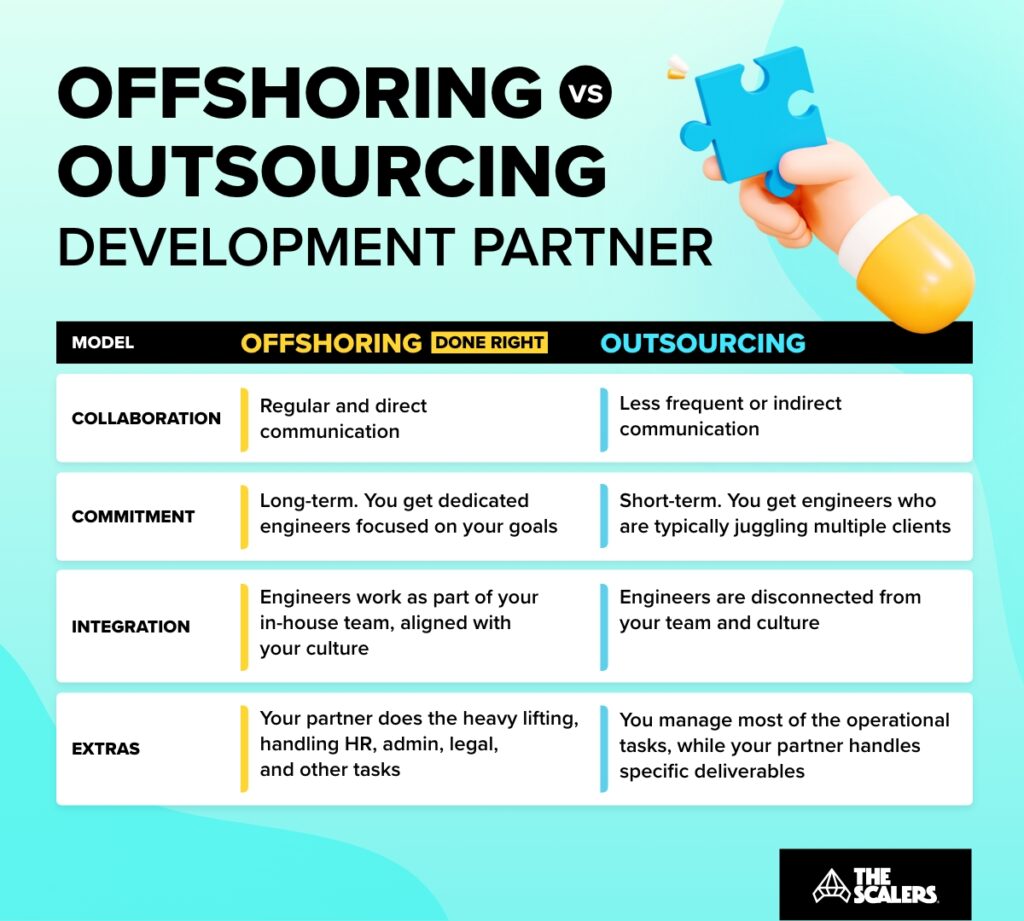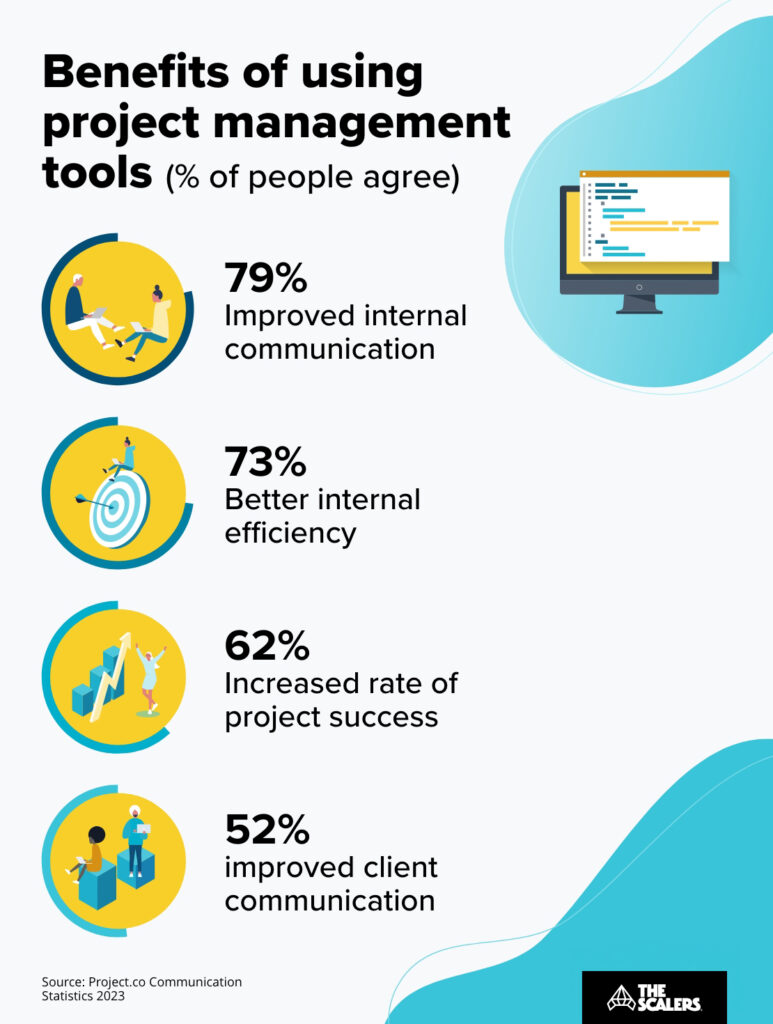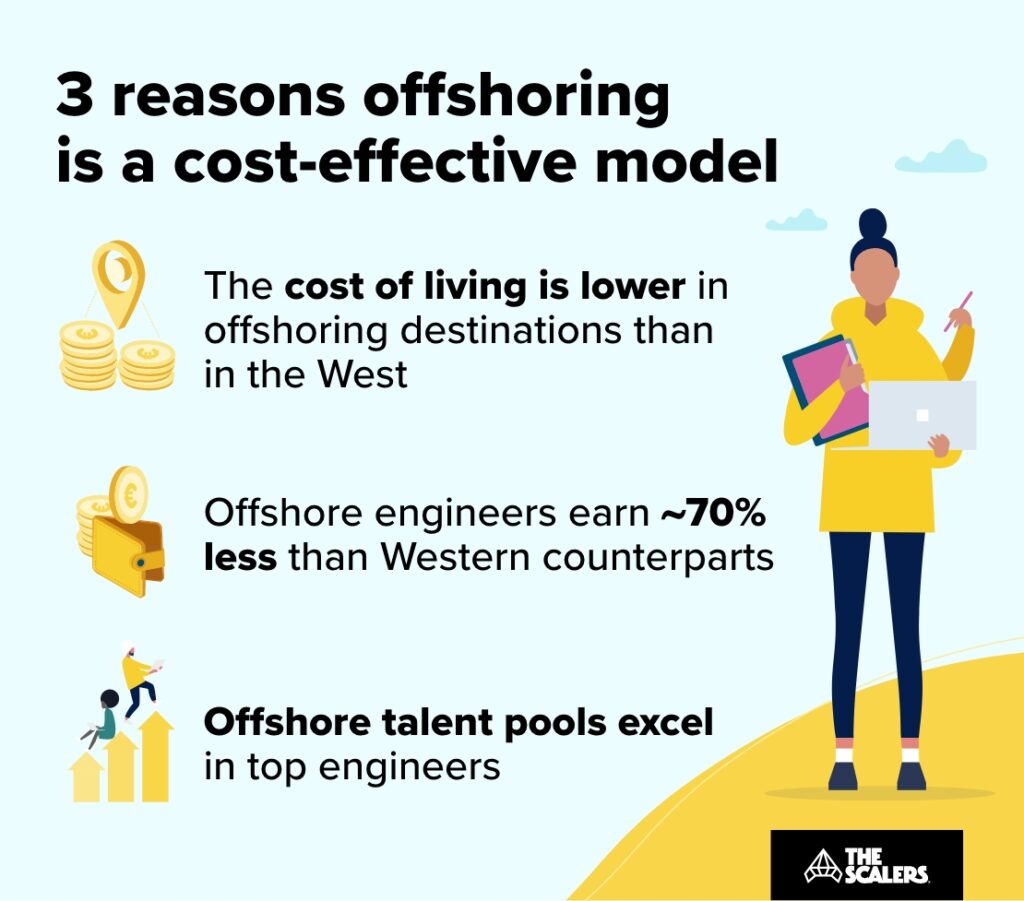Offshoring is (still) perceived as a risky move by many organisations and tech leaders. Many believe that scaling their engineering team and opening an offshore development centre means giving up control over their operations.
But that’s not the case when they find the right offshore development partner. We’re talking about companies that have built dev teams with elite talent and contributed to businesses’ success in multiple industries.
Now, how can you be sure you’re partnering with a reliable company?
This guide — based on our experience building over 80 offshore teams in the past 10+ years — includes everything you need to know about offshore partners, from the advantages to the key factors to consider before partnering with one.
Let’s dive in!
What is an offshore development partner?
An offshore development partner builds tech teams in locations with top talent for organisations that struggle to find skilled professionals locally.
For example, an offshore software partner can help a UK FinTech set up or expand its Quant dev team with world-class engineers in Bangalore, India.
Some of the best offshore development companies go beyond sourcing, hiring, and onboarding. They also manage administrative, legal, and infrastructure tasks on behalf of organisations.
How do offshore development partnerships work?
An offshore partnership is built on a foundation of mutual understanding between the organisation and the partner. Although the process may vary from one partner to another, there are key steps that every successful offshore partnership should follow.
The first step is agreeing on the organisation’s unique requirements regarding team size, skills, and other factors. This way, the partner can start the recruitment process and source, hire, and onboard the first developers for the organisation’s new team.
Other crucial steps for a strong, long-term partnership include:
- Maintaining constant and fluent communication between both parties.
- Keeping the organisation informed and aligned with ongoing developments.
- Ensuring that processes and deadlines are managed according to expectations.
- Offering flexibility and staying open to scaling the team as the organisation’s needs evolve.
In the table below, you can see a comparison of how offshore development partners operate versus how outsourcing partners do. While many businesses use outsourcing and offshoring interchangeably, they represent two different hiring models.

If you want to know more about the differences between both approaches, you can check our article on outsourcing vs offshoring.
Advantages of choosing an offshore development partner
These are the main advantages you can enjoy when collaborating with a reliable offshore development partner:
- Accessing elite talent with niche skills. Offshore development partners source engineers from some of the top tech talent hubs in the world. When you go offshore, you have the chance to build your team with highly specialised professionals you may struggle to find in your home country.
- Getting an excellent value for money. Offshoring and cost-effectiveness go hand in hand. The average base salary of a software developer in the US is around $86,000/year, while its counterpart in a talent-rich country like India earns the equivalent of $9,000/year.
- Concentrating on core business activities. When your partner handles time-consuming tasks like recruiting and administrative work, you can focus more on your product. Partnering with the right offshore company means delegating the heavy lifting to others while you spend most of your time making critical business decisions.
- Gaining round-the-clock operations. A team thousands of miles from your headquarters allows you to cover several time zones, even achieving 24/7 operations. For instance, if your company is based in the UK and your partner sets up a team in Asia, you’ll cover up to 12 hours of overlapping time zones.
- Scaling your team as your business grows. A reliable partner can help you scale your team from a few engineers to over a hundred, depending on your needs and your expansion goals.
How to choose the right offshore development partner
Before signing the dotted line, look at the four key steps you should follow to choose the ideal offshore development partner for your organisation.
1. Evaluate their demonstrated experience
Your offshore software development partner should be able to showcase their successful work track record in building offshore teams with content pieces like case studies.
These materials can offer a perceptive window into what your potential partner can do and how well they do it.
When reading case studies, keep an eye on the following aspects:
- The project approach: Analyse how they talk about their relationship with organisations and how they present the achieved results.
- The delivery: Does the partner sound professional and confident, or arrogant and uninterested? A company’s writing usually matches the personality behind it.
- The vagaries: Rambling language, vague descriptions, and broad claims are red flags!
If you’re willing to go the extra mile, consider checking whether the past clients of your potential offshore development partner are still in business. Look for evidence of significant growth or positive changes in their operations.
In the UK, you can review a company’s accounts filing history on the government’s official website at Companies House. Doing this early research allows you to verify if an offshore partner fits you and your business well.
The Scalers have been providing us with top-quality developers for our projects. Working with their developers has been an absolute pleasure from day one. They have consistently demonstrated their commitment to excellence by providing us with highly skilled, knowledgeable, and professional developers.
2. Assess cost-effectiveness
One of the main benefits of offshoring is lower hiring costs than in Western countries.
The cost of living in nations like India is significantly lower than in the US, Europe, and Australia. Running your offshore software development centre might cost 50% of what you’d pay at home. And that includes taxes, utilities, administration, and every other cost required to manage the team.
However, while price is important, it’s a mistake to simply snap up the cheapest offer. Generally, very low costs relate to very low-quality services.
To make sure you get the best value for money, you must assess your partner’s services’ cost-effectiveness. Get specific about the costs:
- Enquire about quotes, timelines, and future costs. Do you have to pay before they build your team or after? Is there a standard cost breakdown you can read to see how things usually work?
- Ask about the recruitment process, past experiences, and engineers’ quality. What’s your offshore development partner’s recruitment strategy? Which companies have they served in the past?
- Get to know your partner leadership team. Do they have technical leadership experience? What’s their background in the software development industry?
When offshoring, you want to partner with an offshore development company that recruits elite talent for your business. But also one that delivers on its promises and offers an excellent, cost-effective service.
If the price is staggeringly low, be diligent.
3. Evaluate their approach to communication
Communication is crucial when working with an offshore development partner based 10,000 miles away and in a different time zone.
When discussing potential cooperation, take the time to understand how the company conveys information. Learn about their project management/communication tools and plans for fostering open communication between your organisation and the offshore team.
In the initial communication phases, evaluate the responsiveness to emails and calls. Consider factors like the speed of their response and the politeness of their interactions, and pay attention to the company’s confidence and proficiency. Are they asking pertinent questions demonstrating deep technical expertise and understanding of your needs?
While early in the engagement, any communication red flags should be treated seriously, as they can indicate potential challenges down the line.

4. Analyse how they bridge cultural gaps
Building an offshore development team means working with people from different cultures. Though cross-cultural teams are becoming commonplace, establishing smooth relationships between new colleagues can be challenging.
An unreliable offshoring company will pretend that the culture gap isn’t there, while a reputable partner will acknowledge it and offer suggestions on how to bridge it.
For instance, at The Scalers, our executives — who have lived in India for years — act as a bridge between Western and Indian team members. We proudly ensure extra care in bridging cultural gaps during recruitment.
That being said, discussions over cultural differences should be held openly when talking with potential offshore development partners. If they seem hesitant, it’s a sign to be cautious.
Questions to ask before selecting an offshore development partner
Besides the four steps analysed in the previous section, you should consider asking a few questions to verify your offshore development partner and ensure they are the right fit for your organisation:
Where do they source talent from?
If you’re looking to build a world-class tech team, you want your potential partner to source talent from some of the best software development countries. India, Poland, and Colombia are amongst the most popular offshore destinations, with professionals who possess niche programming skills and extensive experience working with Western companies.
What does their recruitment process involve?
Make sure you understand the exact process your potential partner follows to hire an engineer for your team. Consider how many people are involved in recruiting, how they test engineers’ skills and assess cultural fit, and how long it takes them to find the right candidates.
Can they build a team that works just for my business?
Theoretically, most offshore partners assign employees exclusively to one partner. However, you may encounter unreliable partners that not only hire low-quality engineers but also specialists who juggle multiple clients. It’s crucial you verify that your potential partner is (actually) building tech teams with professionals who are 100% focused on your business.
Are they transparent with their pricing?
There are two types of partners when it comes to pricing: those who provide clear, upfront details about their services and rates and those who give vague answers. The latter often charge more through hidden fees that were not clearly disclosed during initial discussions. A reliable partner will always be transparent about pricing and timelines from the very beginning.

Will my data be secure with them?
Data privacy and security are some of the main concerns business and tech leaders have when going offshore. If that’s your case, ask your potential partner what certifications they hold and how they protect your data. For example, you can check if they have received the ISO 27001 accreditation.
Why is The Scalers a trusted offshore development partner?
At The Scalers, we specialise in building world-class dedicated offshore teams with the top 1% of engineering talent in Bangalore, India.
Thanks to our proven offshore model, we’ve helped organisations of all sizes scale their teams with specialists who have been pivotal in launching flagship products and keeping them at the top of their industry.
That’s the case with Nexpoint. This legal US company launched a new SaaS product with the help of their Bangalore Ruby on Rails offshore team.
There’s nothing quite like The Scalers where our employees are literally our employees, not coming through any third party company. They know our culture, and our clients so they can execute meaningful code and deliver meaningful features.
Nextpoint’s success story wouldn’t have been possible without the unique advantages offered by The Scalers’ offshore model:
- Fully dedicated offshore teams with engineers that work 100% under partners’ business names.
- A dedicated office equipped with all the goodies engineers need to perform at their best.
- Ongoing support of a Chief Happiness Officer (CHO) responsible for keeping engineers engaged, happy, and motivated.
- Soft skills training for engineers in topics and fields such as problem-solving, decision-solving, and emotional resilience.
- Workation programs where partners visit their teams in India and spend a week of in-person collaboration, including hackathons, and team building activities.
- A dedicated platform (Team Platform) partners can use to monitor and track their teams, from recruitment to expenses and more.
- A brand new office built from the ground up, as we did for UK FinTech Preqin — they scaled to a 450+ person R&D Centre in Bangalore, so they needed extra space to keep growing!
Are you interested in knowing more about our offshore model and how we can help you set up an elite tech team in India? Reach out to us by filling out this form, and one of our senior executives will get back to you shortly!
In the meantime, we invite you to download our free infographic on how to launch your offshore development operations, where we explain what offshoring is and where to build your new team with a simple, actionable format.
In summary
Choosing an offshore development partner is a decision you shouldn’t take lightly. Besides being responsible for setting up your new dev team, they also play a critical role in engaging your engineers and ensuring they remain aligned with your company’s goals, culture, and values every step of the way.
We hope this evergreen guide has brought you closer to finding the right partner for your business. Feel free to revisit it whenever you have doubts or questions while assessing potential partners.
Key takeaways
-
1
An offshore development partner helps organisations build tech teams by sourcing top talent from locations with a high concentration of skilled professionals.
-
2
A successful offshore partnership involves clearly defining team requirements, maintaining regular communication, managing processes and deadlines, and adapting to scaling needs as the business evolves.
-
3
By partnering with a reliable offshore development company, you gain access to elite talent, cost-effective solutions, the ability to scale teams quickly, and continuous operations across different time zones.
-
4
Look for a partner with proven experience, transparent pricing, a strong recruitment process, effective communication, and a commitment to bridging cultural gaps for long-term success.
-
5
The Scalers is a trusted offshore development partner that builds culturally aligned tech teams with the top 1% of India’s engineering talent.
If you want to learn more than just about picking an offshore technology partner, we recommend you read our offshore development guide. It covers everything you need to know about this popular hiring and engagement model.
FAQs
Because it’s faster, more cost-effective, and scalable. Offshore partners give you access to niche talent that may be unavailable locally, while handling hiring and admin so you can focus on your core business.
By using strict security measures, certifications like ISO 27001, and clear legal agreements such as NDAs. The right partner ensures your IP, data, and ideas remain fully protected.
Don’t choose based on cost alone. Avoid partners with vague processes, unclear pricing, or poor communication. Always check their track record, case studies, and client success stories.
With overlapping work hours, structured check-ins, and modern collaboration tools. Many offshore teams adjust schedules to ensure smooth communication with Europe, the US, and Australia.
Treat your offshore engineers as part of your in-house staff. Align them with your culture, maintain open communication, and adapt processes as your business grows.
Raise issues quickly and work with the partner’s business and technical leads to resolve them. A strong partner provides senior expertise and ensures the team has the right support to overcome challenges.
Build Your Team,
Not Just a Contract
With The Scalers’ offshore dedicated development team, you get engineers who join your workflow for the long run. Grow steadily, stay flexible, and work with people who care about the product as much as you do.







